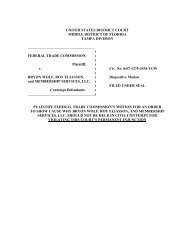HELO RCPT TO QUIT MAIL FROM DATA - Federal Trade Commission
HELO RCPT TO QUIT MAIL FROM DATA - Federal Trade Commission
HELO RCPT TO QUIT MAIL FROM DATA - Federal Trade Commission
Create successful ePaper yourself
Turn your PDF publications into a flip-book with our unique Google optimized e-Paper software.
I. Introduction and Overview<br />
Subject Line Labeling As a Weapon Against Spam<br />
The <strong>Federal</strong> <strong>Trade</strong> <strong>Commission</strong> (the “FTC” or “<strong>Commission</strong>”) submits this<br />
Report pursuant to Section 11(2) of the Controlling the Assault of Non-Solicited<br />
Pornography and Marketing Act of 2003 (the “CAN-SPAM Act”), 15 U.S.C.<br />
§ 7710(2) (2003), which requires the <strong>Commission</strong> to submit “a report that sets<br />
forth a plan for requiring commercial electronic mail to be identifiable from<br />
its subject line, by means of compliance with Internet Engineering Task Force<br />
Standards, the use of the characters ‘ADV’ in the subject line, or other comparable<br />
identifier, or an explanation of any concerns the <strong>Commission</strong> has that cause the<br />
<strong>Commission</strong> to recommend against the plan.”<br />
In preparing this Report, the <strong>Commission</strong> used a number of techniques<br />
to obtain information from numerous individuals and organizations. First, in<br />
January and February 2005, the <strong>Commission</strong> interviewed thirty individuals<br />
representing nineteen organizations, including consumer groups, privacy groups,<br />
email marketers, Internet Service Providers (“ISPs”), and technologists. 1 A court<br />
reporter transcribed these interviews. 2<br />
Second, using its compulsory process powers under Section 6(b) of the FTC<br />
Act, 15 U.S.C. § 46(b), the <strong>Commission</strong> required nine ISPs that collectively<br />
control over 60 percent of the market for consumer email accounts to provide<br />
detailed information concerning their experiences with spam. 3 The 6(b) Orders<br />
required the ISPs to provide detailed information regarding their anti-spam<br />
technologies, volume and types of spam reaching their mail servers, and email<br />
authentication testing data. 4<br />
1. A complete list of interviewees has been attached to this Report as Appendix 1.<br />
2. Citations to these transcripts identify the organization, representative from the organization, and<br />
page number of the transcript. For instance, the citation “Microsoft: Katz, 16,” would refer to a statement<br />
made by Microsoft employee Harry Katz on page 16 of the transcript. The <strong>Commission</strong> has posted the<br />
transcripts online at http://www.ftc.gov/reports/advlabeling/xscripts/index.html.<br />
3. The <strong>Commission</strong> issued 6(b) Orders to America Online (“AOL”), SBC, Road Runner, Bell South,<br />
Verizon, Cox, Earthlink, Microsoft, and United Online (“UOL”). The <strong>Commission</strong>, in preparation for its<br />
National Do Not Email Registry Report to Congress, previously issued 6(b) Orders to AOL, Comcast,<br />
Earthlink, Microsoft, MCI, UOL, and Yahoo!.<br />
4. To ensure that their anti-spam techniques do not become known to spammers, ISPs have requested<br />
confidential treatment of their 6(b) Order responses. When possible, the <strong>Commission</strong> has aggregated data<br />
from these responses. When the <strong>Commission</strong> relies on a 6(b) Order response from a particular ISP, this<br />
Report does not identify the particular ISP.<br />
1

















